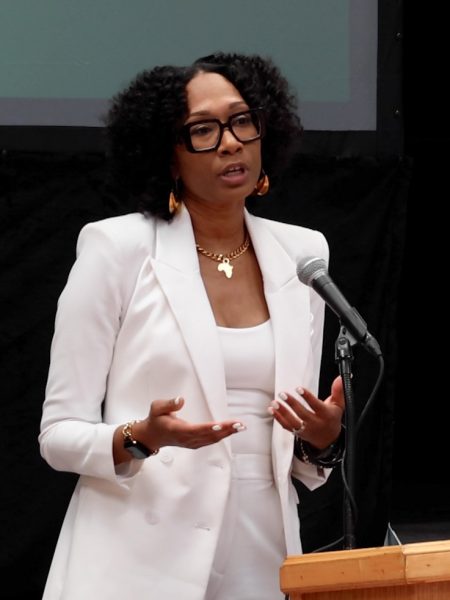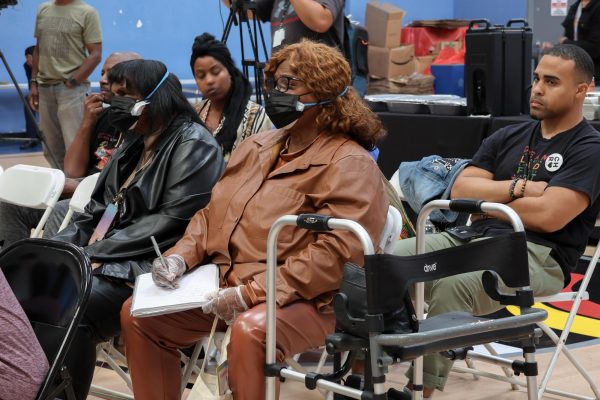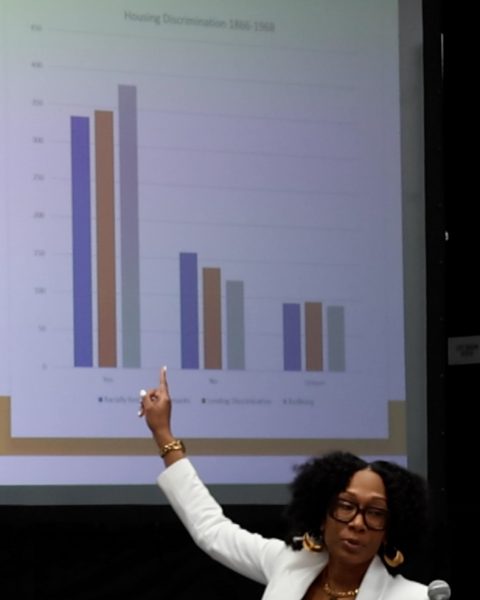The crowd did not appear shocked by the survey results shared at the Los Angeles Civil Rights’ “Black Experience Study” event; rather, the All Peoples Community Center remained fairly quiet, for it seemed as though almost everyone understood what it means to be a Black Angeleno.
For the past year, the City of Los Angeles Reparations Advisory Commission has been working alongside California State University, Northridge and Mockingbird Analytics to gather community research. CSUN Africana Studies Department Chair Dr. Marquita Gammage served as principal investigator for the project, which had a total of 618 participants.

“We hosted a comprehensive survey, as well as focus groups and interviews with Black Los Angelenos,” Gammage says, “to find out about their experiences with enslavement, state sanctioned discrimination and their everyday lived experiences here in Los Angeles.”
Gammage says studies like these may take years, decades and even centuries to complete, but what’s different about this study is the city’s involvement. The survey and interviews were the start of a two-year process. The next step is to present these findings at five public meetings for feedback, Gammage says, to ensure the recommendations align with public desires. Afterwards, the results will be sent to the RAC to create a list of reparation recommendations to be presented to City leaders by 2025.
“I think that California in and of itself is doing something different when you have the state and multiple cities and counties now addressing these injustices,” says Gammage.
The study is being watched closely by other organizations hoping to use it as a blueprint for their communities. “We’ve got contacted by multiple different places, they want to see our detailed survey,” Gammage says. “So, they may consider following a similar survey for their general population as well.”
This is the most recent project organized by the RAC, which was first established in 2021 by former Los Angeles Mayor Eric Garcetti. Diamond James is the Director of the Office of Race and Equity, who says the purpose of her department is to fight hate and discrimination.
James says the RAC has received mainly positive feedback from the public, albeit with some slight hesitation. “This has been a long conversation, you know, in so many people’s families for generations,” says James. “I think residents what community members really want to know, is this possible? They also want to know, you know, we haven’t seen it, but is this going to be done?”
This sentiment was reflected in the Q&A portion of the event. Local construction worker Walter Edwards says he has concerns that there were too few participants who responded to the survey.
“Talk about slavery and Jim Crow and redlining, war on drugs, systemic racism. Yes. We’re here. We have a problem. This is a national disaster,” Edwards said. “I know a lot of people was hurt. And if they would believe that you would do something, they would come out in droves.

The “Black Experience Study” began on Juneteenth 2023 when the survey was first released to the public and stayed open for eight months, closing this February.
It revealed 82% of respondents said they had a family history or lineage of state-sanctioned enslavement, but the majority could not identify their history of enslavement in Los Angeles. Gammage said this statistic is unsurprising because the system was designed to tear families apart.
Over 75% of respondents said the city’s policies around law enforcement have negatively impacted their lives, and 73% gave economic growth a negative rating as well. According to 79% of the respondents, these two factors were the primary reasons for them moving away from Los Angeles. These respondents said they want the city to address law enforcement injustices as a form of restorative justice.

Over half of respondents said they experienced housing discrimination to some degree, such as redlining, mortgage lending discrimination and outright denial of home loan. Even after redlining was outlawed, 80% of respondents said they faced limitations from the city about where they could buy a home. An overwhelming percentage of respondents said they requested debt forgiveness and equity adjustment, along with monetary compensation.
In the academic setting, 51% of families said they experienced school segregation as well as unequal educational opportunities. Additionally, over half said the curriculum itself lacked cultural compatibility and access to academic resources such as Advanced Placement courses. Respondents said cultural inclusion and culturally competent educators were critical reparations, along with 81% asking for free college tuition.
Throughout the project, the university brought in several students to assist in a multitude of ways. “They handled the transcription process, for example,” Gammage said. “CSUN students also got the opportunity to work with the geospatial team to be able to do some of the heat maps and some of the Black community.”
While the school’s involvement with the “Black Experience Study” is ending, Gammage said the Africana Studies department will continue to focus on reparations in Los Angeles. “A lot of our courses are centered around the Black community,” she says. “We’ll continue to try to support the community through educational efforts, but also continue to be an academic research partner to be able to address these types of issues and concerns.”











